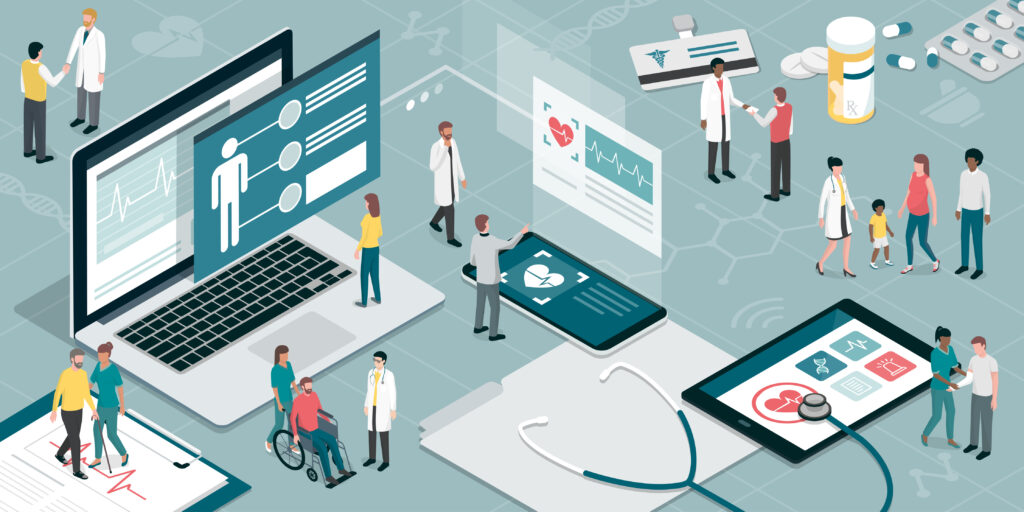Data is pivotal, and the healthcare industry stands at the forefront of a revolution. The rise of big data analytics in healthcare is reshaping patient care, diagnosis, and overall medical outcomes.
Read on to explore this transformative technology’s significance, benefits, challenges, and promising future.
What Is Big Data Analytics?
Big data has been defined as “large volumes of high velocity, complex, and variable data that require advanced techniques and technologies to enable the capture, storage, distribution, management, and analysis of the information.”
Data scientists and data analysts typically subdivide big data into different categories or streams of information, including:
- Web and social media data generated from user interactions on websites and mobile apps.
- Machine data generated from sensors, meters, and other devices.
- Transactional data, such as healthcare claims and other billing records.
- Biometric data, such as fingerprints, genetics, and handwriting.
- Human-generated data, including structured data (information that can be stored in the rows and columns of a table), unstructured data (which cannot), and semi-structured data, which is partially but not fully structured.
The term “big data in healthcare” refers to the use of big data analytics in the healthcare industry, which is growing at an explosive pace. According to Straits Research, the global market of big data in healthcare is projected to grow from $33 billion in 2021 to $106 billion in 2030 at an annual rate of 14%.
Examples of Healthcare Big Data Analytics

Big data in healthcare can be applied to everything from population health management to drug discovery and trials. Below are just a few use cases of healthcare data analytics:
- Patient segmentation: Healthcare data analytics can slice and dice patient data, segmenting this broader population along many different axes. For example, drug companies can use patient segmentation to discover potential candidates for a clinical trial of a new treatment.
- Health plan analytics: Health plans can use big data analytics to improve the customer experience, lower medical costs, reduce inefficiencies, drive innovation, and more.
- Treatment outcome analysis: Given inputs such as DRG codes, big data solutions can predict patient outcomes and calculate the costs of treatments.
- Evidence-based medicine: Using the evidence available from scientific procedures, healthcare data analytics can help support decision-making in clinical settings.
- Real-time patient monitoring: Hospital sensors and monitors can keep track of patients in real-time using streaming data and trigger interventions by hospital staff if necessary.
- Clinical Decision Support: Using data analytics to provide physicians and healthcare providers with patient-specific assessments or recommendations to aid clinical decision-making.
- Predictive Analytics for Patient Risk: Identifying patients at risk of developing specific conditions or complications. For instance, predicting which patients are at higher risk of hospital readmission.
- Telehealth Analytics: Monitoring and analyzing patient data from remote monitoring tools to ensure patient adherence to treatment plans and to predict potential health issues.
- Patient Satisfaction and Experience: Analyzing patient feedback, surveys, and other qualitative data to improve hospital amenities, patient care practices, and overall patient experience.
- Wearable Device Analytics: Analyzing data from wearable health devices like fitness trackers and smartwatches to monitor patient health metrics in real time.
What Are the Benefits of Big Data Analytics in Healthcare?

Using big data analytics in healthcare has multiple advantages for a wide range of organizations, from independent clinics to massive pharmaceutical firms. This section will discuss five of the biggest benefits of big data healthcare analytics.
1. Cost Reduction
According to Datavant CEO Pete McCabe, smarter use of big data could eliminate 50%–75% of wasted healthcare costs, saving the U.S. healthcare system $500 billion to $750 billion. By identifying patterns and trends, big data analysis can help healthcare organizations discover areas where they can improve efficiency and cut costs. For example, predictive analytics can accurately forecast the demand for medical supplies in different hospital departments, helping administrators make purchases when prices are at a low point.

2. Minimizing Medical Errors
Applying big data analytics in healthcare can help dramatically reduce medical error rates. By analyzing data such as electronic health records (EHRs) for anomalies, data analytics solutions can flag suspicious entries for manual inspection by a healthcare professional. For example, researchers at Johns Hopkins have developed a technique to harness big data for correcting diagnostic errors, comparing patient symptoms with diseases that are frequently misdiagnosed.
3. Improving Diagnostics and Predictions
While computers aren’t able to take the place of human physicians, they can support our work and improve the care quality. Particularly, AI and machine learning algorithms can analyze healthcare provider data to predict the most likely diagnoses for a patient’s condition. Besides they are also able to suggest tests to confirm a diagnosis. Meanwhile, big data analytics can pinpoint patients – the one being at the greatest risk for adverse healthcare outcomes.
4. Increasing Health Indicators
The application big data analytics has been shown to improve public health indicators across many fields, from diabetes to suicide mortality rates and mental disorders. According to a study in the Journal of Medical Internet Research, the use of big data analytics has been effective for use cases such as diagnosing illnesses and managing chronic diseases.
5. Enhancing Patient Experiences
Utilizing data analytics helps healthcare providers make smarter decisions about how to improve patient care and their patient experience. Thanks to big data analytics, patients can receive better care for better outcomes, and be more satisfied when interacting with healthcare professionals.
What Are the Challenges of Implementing Big Data Analytics in Healthcare?

Despite the advantages of big data analytics, implementing these solutions isn’t always straightforward. Below are some concerns that healthcare organizations should consider before starting a big data analytics project.
- Data quality: Healthcare data is primarily unstructured and available in many different formats. Organizations need to improve the quality of this data before it can be used effectively, removing duplicate and out-of-date information and providing structure to unstructured data.
- Data storage and sharing: Medical and healthcare data is often scattered across many sources, from different teams and departments within a hospital to state and national governments. Integrating all of these sources under one roof is no easy task.
- Data literacy: Big data in specialized industries like healthcare often needs to be interpreted by subject matter experts who understand its implications. Using big data in healthcare effectively requires a level of familiarity with what the contents of this data mean.
- Data security and privacy: Healthcare organizations are subject to laws such as HIPAA that govern the use of sensitive patient health data. Big data healthcare solutions must ensure their compliance with these regulations.
What Is the Future of Big Data Analytics in Healthcare?

Big data analytics is already disrupting the world of healthcare, but there’s more to come on the horizon. The end goal of healthcare data analytics is to achieve an integrated, real-time data landscape that can easily provide a big-picture view or drill down into specific insights.
Technology advances such as creative interfaces, wearable technologies, and machine learning models will all affect the data collection and analysis process. Big data can also support “the empowered patient,” strengthening the physician–patient relationship and actively engaging patients in their healthcare.
What To Consider When Choosing a Solution for Big Data for Healthcare

Looking to choose the right data science solution for big data analytics in health care? You’re not alone. Below are some of the factors you should take into account when you’re in the market for a healthcare data analytics solution:
- Time-to-value: The best healthcare data analytics solution is useless if it spends months or years languishing in development. The faster your choice of solution can deliver results, the sooner you can start enjoying the benefits of big data healthcare analytics.
- Integrations: While a pretty user interface is a “nice-to-have” feature, what’s really important is the data accessible beneath the surface. Big data analytics solutions should integrate information from a wide range of sources for the most effective results.
- The solution provider: Healthcare organizations may develop their own big data solutions in-house, or they may work with a third-party analytics provider. Any healthcare solutions provider should have a solid track record of success and experience with navigating HIPAA and other healthcare regulations.
How KMS Can Help with Healthcare Analytics Solutions
Big data healthcare analytics is a fascinating and rapidly evolving field that can revolutionize the healthcare delivery and experimenting process. Healthcare organizations can leverage the massive quantities of data to gain new insights and make smarter decisions about patient care, research, and population health management.
To fully realize the potential of big data analytics, healthcare providers should work with a skilled and experienced third-party technology partner. KMS Healthcare is a leader in healthcare technology, delivering high-quality healthcare software engineering solutions. Our dedicated team of experienced developers has a wide range of expertise, from healthcare mobile apps to interoperability and automated testing techniques.

Are you looking for guidance with your next big data analytics project? KMS is here to help. We provide expert healthcare resources to build and connect software products for long-term success. Get in touch with us today to schedule a free project evaluation.

